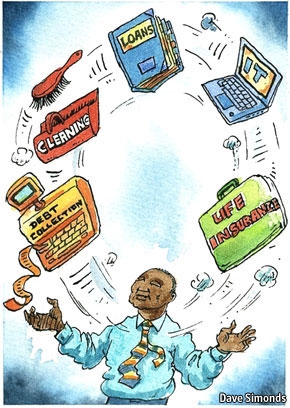Western serial entrepreneurs, meet African parallel entrepreneurs
 Friday, June 29, 2012 at 10:56AM
Friday, June 29, 2012 at 10:56AM  Nifty Economist story on what economist George Ayitteh likes to dub the "cheetah generation" of Africa's business community (they're young, they're agile, and - unlike the preceeding "hippo generation" they don't blame Africa's woes on former colonialists but instead aim to fix things themselves by pursuing better business practices).
Nifty Economist story on what economist George Ayitteh likes to dub the "cheetah generation" of Africa's business community (they're young, they're agile, and - unlike the preceeding "hippo generation" they don't blame Africa's woes on former colonialists but instead aim to fix things themselves by pursuing better business practices).
Article contrasts serial entrpreneurs (who start company after company in sequence over their lives) with parallel entrepreneurs (who start mini-conglomerates of companies and seek to grow them all synergistically over time). The Economist argues that this is really the way things are unfolding in successful African economies.
Speaking from experience, I couldn't agree more. Virtually every deal I'm currently structuring or pursuing in Africa involves these parallel entrepreneurs. They all seem about 35 and they're all running this cluster of companies that involve them in all manner of adjacent opportunities and economies (most of these clusters extend over several African states). They're amazing ambitious "young" people (I'm 50 . . . ahum!) and they approach every opportunity with a lot of vigor and near-perfect business manners, making them a dream to work with.
Outside investors, says the article, worrying that jacks-of-all-trades means good at none, but, according to one business analyst:
It makes African business leaders agile and adaptable - both good skills that are absent in many developed economies.
The key, I find, is to pair these types with financial players close enough to Africa (geographically and mentally) to realize their business worth.
Entrepreneurs are the life blood of an economy, because they create jobs and nothing is more important to sustainable growth.










Reader Comments (1)
If you look at the early colonial period in the US this was something that was common where people would farm, sell life insurance, and engage in a lot more. It seems a bit of a missing art form from today's America that's been lost in time.